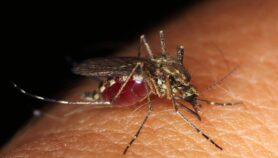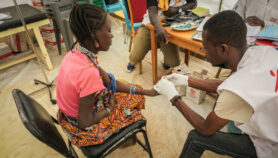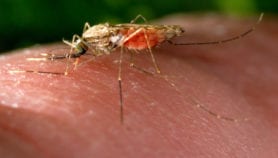24/07/19
Drug-resistant malaria spreading fast in South-East Asia

By: Fatima Arkin
Send to a friend
The details you provide on this page will not be used to send unsolicited email, and will not be sold to a 3rd party. See privacy policy.
[MANILA] A multi-drug resistant strain of malaria parasite Plasmodium falciparum spreading rapidly out of Cambodia since 2015 is now entrenched in Laos and Vietnam and threatens to move out of South-East Asia into Africa and other parts of Asia, according to scientists who have conducted two new studies.
Published this month (22 July) in Lancet Infectious Diseases, one study shows that the new P. falciparum strain, which is resistant to artemisinin and its widely-used partner drug piperaquine, represents more than 80 per cent of parasites circulating in northeast Thailand and Vietnam, while artemisinin resistance has been confirmed in Myanmar.
“These parasites are also now resistant to several classes of antimalarial drugs and we have fewer and fewer options for treating them, posing increasingly difficult challenges for elimination”
Olivo Miotto, Oxford University
Of the four types of malaria parasites P. falciparum is most likely to cause life-threatening complications.
According to another study, the new and powerful frontline drug combination, dihydroartemisinin-piperaquine (DHA-PPQ), has failed in half of the cases in western and northeastern Cambodia, northeastern Thailand, and southwestern Vietnam between 2015 and 2018.
Olivo Miotto, one of the authors of the genomic epidemiology malaria study and associate professor at Britain's Oxford University, told SciDev.Net: “We already knew that P. falciparum parasites resistant to DHA-PPQ circulated in the region covered by the study. But we now have evidence that they have continued to mutate, increasing their level of resistance — making the therapy even more prone to failure.”
The study focused on a P. falciparum lineage called KEL1/PLA1 that has diversified into a set of subgroups that show newly emerging alleles of the drug-resistance transporter PfCRT associated with increased risk of frontline treatment failure.
The study, which analysed genomes of 1,673 P. falciparum samples from 19 provinces across Cambodia, Laos, northeast Thailand and Vietnam, found that KEL1/PLA1 had spread from Cambodia across the surveyed countries, with prevalence higher than 50 per cent in all regions except Laos.
Miotto said that the continued mutation of P. falciparum happened in a brief span of time, which may indicate that parasites with “enhanced” drug resistance can expand aggressively. “These parasites are also now resistant to several classes of antimalarial drugs and we have fewer and fewer options for treating them, posing increasingly difficult challenges for elimination,’’ he added.
There are concerns that resistant strains could spread to the Pacific islands. Tran Tinh Hien, a co-author of the other malaria study – a multi-country randomised trial – and a director at Oxford University’s clinical research unit in Hanoi, Vietnam, told SciDev.Net that “genes associated with artemisinin resistance have been identified in Papua New Guinea”.
Arjen Dondorp, who led the randomised trial, and is a deputy director at Mahidol University, Bangkok, believes resistant malaria strains could spread through Asia and beyond, particularly Africa which has the most P. falciparum malaria cases.
According to WHO, in 2017, just over 200 million cases of malaria were reported in 87 countries, with P. falciparum parasites accounting for almost 63 per cent of cases in South-East Asia and 72 per cent in the Western Pacific. Roughly 435,000 people died of malaria worldwide in 2017, reported WHO.
“The increasing antimalarial drug resistance problems in the eastern Greater Mekong Subregion countries, including Vietnam, re-emphasise the urgency for accelerated falciparum malaria elimination in these countries,” Dondorp told SciDev.Net. “Otherwise, this now very resistant [strain of] malaria can come back, making the aim for malaria elimination impossible.”
Countries in the region must also consider alternative first-line treatments, such as with pyronaridine-artesunate, said Fidock, adding: “There are clinical trials under way to test the efficacy of triple combination therapies to treat drug-resistant malaria.”
This piece was produced by SciDev.Net’s Asia & Pacific desk.













